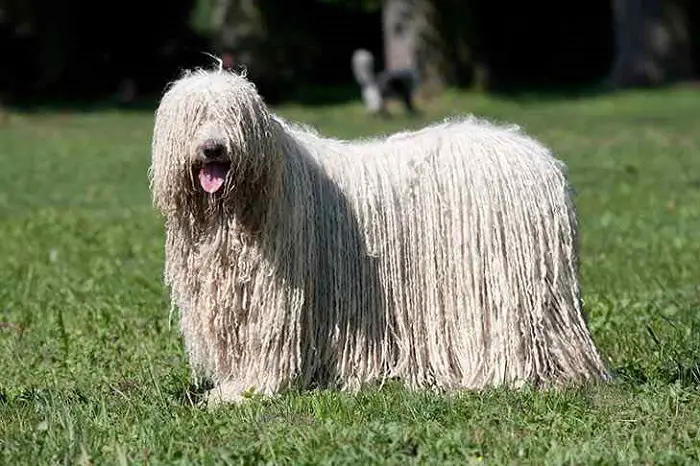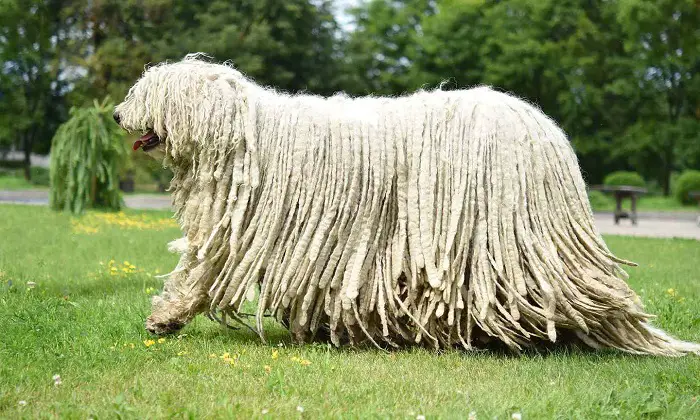The Komondor Dog is a working breed that originated in Hungary. The densely corded Komondor is the largest of the Hungarian livestock guardian dogs. The alternative name for the dog is Hungarian Commonmop or Hungarian Sheepdog, or Mop Dog. They are athletic, fast, and powerful dogs.
The Komondor Dog is affectionate with their family and gentle with the kids and friends of their family. This article gives you a clear conception that is very interesting for a Komondor lover. So, please stick with us and continue reading!
History and Origin of Komondor Dog
The Komondor dogs are believed to be descended from Tibetan dogs from Asia to Hungary with the nomadic Magyars around AD 900. It was developed as a flock guardian and continues to do this work today. It is also kept as a companion.
Physical Description of Hungarian Sheepdog
The dog is a large, muscular, well-boned dog with a broad head and almond-shaped, dark brown eyes. The nose is usually black, although a dark brown or gray nose is acceptable.
The drop ears are medium-sized, the chest is deep, and the tail is long and curved. The double coat has a dense, woolly undercoat and a heavily corded, white outer coat. The skin is gray.
Height, weight, and Lifespan Komondor Dog
- The average height of the Komondor Dog is about 25.5 to 30 inches (60 to 70 cm).
- The average dog weight of the dog breed is about 80 to 120 pounds (35 to 55 Kg).
- The average life expectancy of a dog is about 10 to 12 years.
Temperament or Personality of Hungarian Sheepdog
It is calm, alert, and protective. It is devoted to family but wary of strangers. Although it is an independent breed, it rarely roams.
Best Ownership of Hungarian Mop Dog
The komondor requires a firm, dog-experienced owner in a rural home.
Special Needs of Komondor Dog Breed
The Komondor is a unique dog breed with distinct characteristics and special needs. Here are some of the specific requirements and considerations for caring for a Komondor:
- Coat Care: The Komondor’s most recognizable feature is its long, corded coat. This coat requires extensive grooming to prevent matting and keep it healthy. Regular brushing, bathing, and drying are necessary to maintain the coat’s condition. The cords should be separated regularly to prevent them from fusing.
- Exercise and Space: Komondors are large, energetic dogs that require ample exercise to keep them physically and mentally stimulated. They benefit from daily walks, runs, or play sessions in a securely fenced area. Due to their size, they need enough space to move around comfortably.
- Socialization: Early socialization is crucial for Komondor puppies. They have a strong guarding instinct and can be protective, so exposing them to different people, animals, and environments from a young age is essential. Proper socialization helps them develop into well-adjusted, confident dogs.
- Training and Leadership: Komondors are intelligent but can be independent and strong-willed. Consistent, positive reinforcement training methods work best with this breed. They respond well to firm, fair, and patient handling. Establishing a leadership role early on and providing consistent rules and boundaries will help them understand their place in the family.
- Guarding Instincts: Komondors are natural guardians and have strong protective instincts. They are typically wary of unknown persons and will act to protect their family and territory if they perceive a threat. Early socialization and ongoing training can help them distinguish between real threats and routine situations.
- Health Concerns: Like any breed, Komondors have particular health concerns that need attention. They can be vulnerable to hip dysplasia, bloat (gastric dilatation-volvulus), and skin issues. Regular vet check-ups, a balanced diet, and appropriate exercise can improve their health and well-being.
- Climate Considerations: The Komondor’s dense, corded coat can make them more heat-resistant. It’s essential to provide them with shade, fresh water, and a calm environment, especially during hot weather. Adequate ventilation and proper grooming can help manage their body temperature.
- Companionship: Komondors thrive when they have a close bond with their family. The Hungarian Mops are loyal and protective, making them excellent companions and guard dogs. They do best when they interact regularly with humans and are included in family activities.
Remember, the specific needs of individual Komondors can vary, so it’s essential to consult with reputable breeders, veterinarians, and experienced Komondor owners for personalized guidance and advice.
Health Concerns of Hungarian Sheep Dog
The Hungarian Sheepdog, or the Puli, is a hardy and generally healthy breed. However, like all dog breeds, they can be prone to specific health conditions. Some of the Concerns related to health that may affect Hungarian Sheepdogs include:
- Hip Dysplasia: This common orthopedic condition affects many dog breeds, including the Hungarian Sheepdog. It is characterized by abnormal hip joint development, leading to discomfort, lameness, and arthritis. Hip dysplasia can be triggered by genetics and environmental factors.
- Progressive Retinal Atrophy (PRA): PRA is a group of genetic eye disorders that gradually lead to retinal degeneration. PRA can result in progressive vision loss and, in some cases, blindness. Regular eye examinations by a veterinary ophthalmologist can help detect PRA early on.
- Allergies: Hungarian Sheepdogs can be prone to allergies, including food allergies, environmental allergies (such as pollen or dust mites), and contact allergies. Allergic reactions may manifest as skin irritations, itching, redness, and ear infections. Identifying and managing allergens can help alleviate symptoms.
- Hypothyroidism: Hypothyroidism in dogs develops when the thyroid gland doesn’t produce enough thyroid hormone. It can lead to weight gain, lethargy, hair loss, and skin problems. Blood tests can diagnose this condition, and lifelong medication can help manage it.
- Gastric Dilatation-Volvulus (Bloat): Bloat is a serious and potentially life-threatening condition affecting deep-chested breeds like the Hungarian Sheepdog. It involves the stomach filling with gas and twisting, which can lead to restricted blood flow and organ damage. Bloat requires immediate veterinary attention.
- Epilepsy: Epilepsy in dogs is a neurological disease characterized by recurring seizures. While the exact cause is often unknown, it can have a genetic component. Medications are available to manage and control seizures in affected dogs.
Concluding Words on Komondor Dog
The Komondor Dog is fun-loving and likes to keep their human companions in sight. The dog is wary of strangers and fiercely protective. They are usually good with children and adaptable to other pets.
Well, it’s time to leave today. We’ll come back soon with some new ideas. Until then, surf this website and give us feedback. We’ll wait for your response. Also, don’t forget to share this information with your close friends.
If you are interested in other beautiful dog breeds, don’t hesitate to visit our website. Thank you so much for your patience, attention, and participation.

